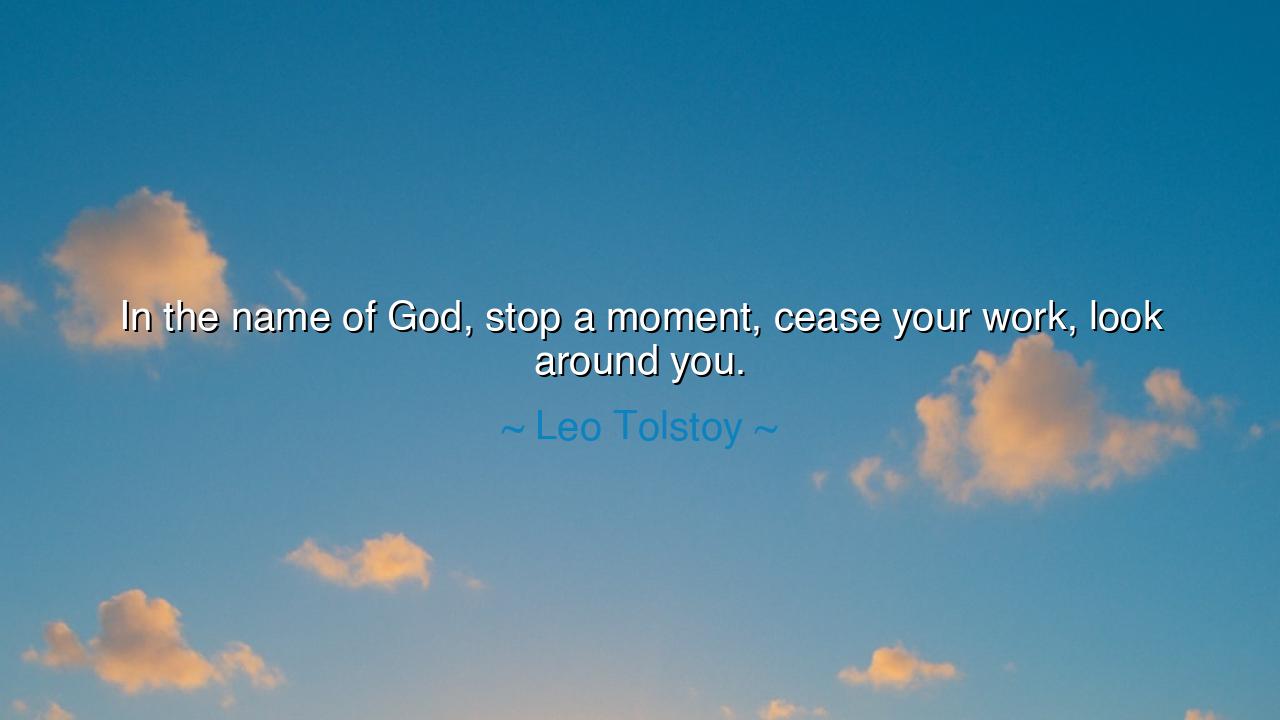
In the name of God, stop a moment, cease your work, look around






When Leo Tolstoy declares, “In the name of God, stop a moment, cease your work, look around you,” he speaks as a prophet crying against the blindness of endless labor. His words remind us that man, in his pursuit of toil and achievement, often forgets the beauty, the suffering, and the mystery that surrounds him. To invoke the name of God is to give his command the weight of eternity: life is not only for striving, but for seeing.
The origin of this wisdom lies in Tolstoy’s own awakening. A man who once sought glory in war and literature, he later turned toward simplicity and spiritual truth. He saw that relentless work and ambition could consume the soul, blinding one to the wonders of life — the fields, the sky, the faces of the poor, the eternal presence of the divine. His cry is not against labor itself, but against the loss of awareness when labor becomes chains.
To “look around you” is more than to glance with the eyes; it is to awaken the heart. It is to perceive the humanity of others, the sacredness of nature, the fleeting gift of existence. In every flower and every suffering face, in every moment of silence, there is a lesson greater than that found in endless busyness. Tolstoy calls us to remembrance: that man was not created to be a machine, but a soul in communion with the world.
His words are also a rebuke to societies that prize productivity above all. In the fever of progress, men forget their neighbors, exploit the earth, and neglect the presence of God. Yet to pause, to cease even for a moment, is to restore balance — to remember that work must serve life, not consume it.
Let the generations remember: the measure of life is not only in what is built or earned, but in what is seen, cherished, and understood. Tolstoy’s words endure as a timeless call to pause amid the storm, to lift one’s gaze from ceaseless labor, and to behold the world — radiant, fragile, and divine.






DHDuyen Ha
This quote reminds me of the importance of taking breaks and connecting with the world around us. It’s so easy to get lost in the demands of our day-to-day life. Do you think that constantly working without stepping back to observe can lead to burnout or a lack of fulfillment? How can we cultivate habits that allow us to pause and reflect more often?
KTKien Trung
Tolstoy’s words are a call to reflect on our surroundings and the life we’re living. We’re so conditioned to be productive that sometimes we forget to truly live. Have you ever felt like you were rushing through life without truly experiencing it? What do you think it takes to break free from this cycle of constant doing?
QNQuynh Nhu
This quote really resonates with the idea of being present and mindful. It's easy to get wrapped up in the busyness of life, but Tolstoy is calling us to pause and observe. Do you think that taking moments to stop and reflect throughout the day can improve our well-being? How often do we allow ourselves to do that in the rush of daily tasks?
THNguyen Thu Hien
Leo Tolstoy’s quote feels like a gentle reminder to slow down and truly appreciate the world around us. In today’s fast-paced world, we often get caught up in our work and routines, forgetting to take a step back. Do you think we have lost the ability to truly 'see' the world because we’re so focused on productivity? How can we find the balance between work and mindfulness?